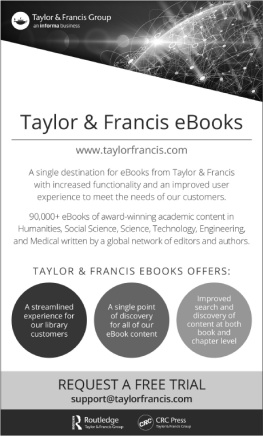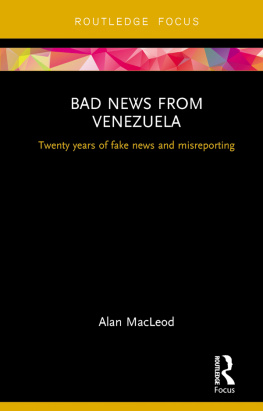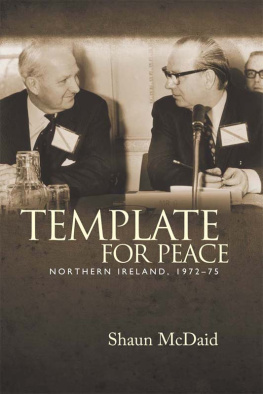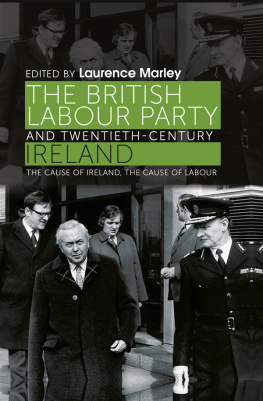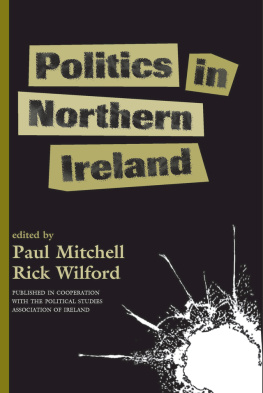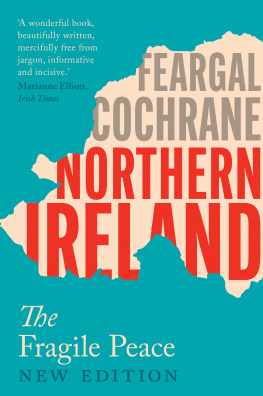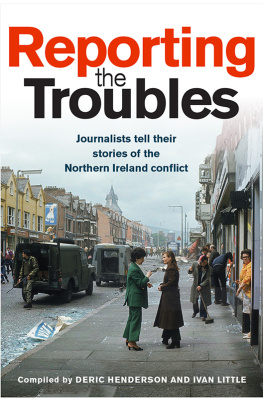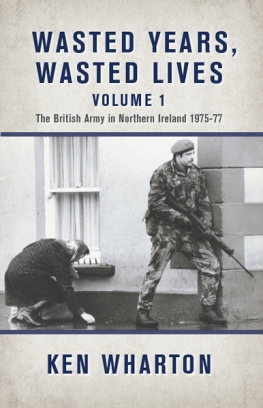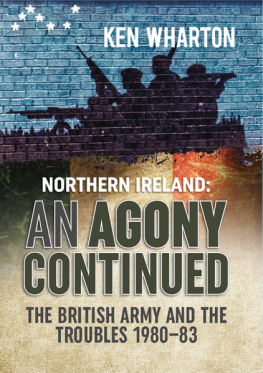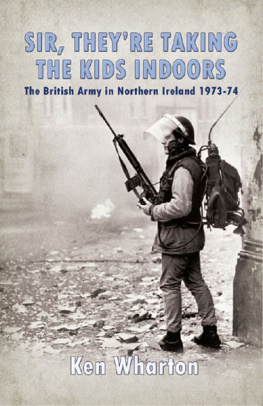Alan MacLeod is Research Fellow at the University of Leeds and an expert on the Northern Ireland peace process and its international dimensions. He gained his PhD at the University of Glasgow.
MacLeod lifts the Troubles out of their traditional paradigm. He shows how the careful and sophisticated application of multi-archival international history can transform our understanding of the modern history of the British Isles.
Simon Ball, Chair of International History and Politics, University of Leeds
INTERNATIONAL
POLITICS AND
THE NORTHERN
IRELAND
CONFLICT
The USA, Diplomacy and the Troubles
A LAN M AC L EOD
To TM and NTM
Published in 2016 by
I.B.Tauris & Co. Ltd
London New York
www.ibtauris.com
Copyright 2016 Alan MacLeod
The right of Alan MacLeod to be identified as the author of this work has been asserted by the author in accordance with the Copyright, Designs and Patents Act 1988.
All rights reserved. Except for brief quotations in a review, this book, or any part thereof, may not be reproduced, stored in or introduced into a retrieval system, or transmitted, in any form or by any means, electronic, mechanical, photocopying, recording or otherwise, without the prior written permission of the publisher.
References to websites were correct at the time of writing.
International Library of Twentieth Century History 89
ISBN: 978 1 78453 538 4
eISBN: 978 1 78672 011 5
ePDF: 978 1 78673 011 4
A full CIP record for this book is available from the British Library
A full CIP record is available from the Library of Congress
Library of Congress Catalog Card Number: available
ACKNOWLEDGEMENTS
This book is the product of research conducted during my PhD studies at the University of Glasgow. That research would not have been possible without the support of the Arts and Humanities Research Council (AHRC), which allowed me to undertake research in three different countries and a host of archives. I am deeply indebted to the archivists of the following institutions in helping me access all the relevant materials: the Bodleian Library, Oxford; Churchill College, Cambridge; the UK National Archives, Kew; the Public Records Office of Northern Ireland, Belfast; the National Archives, Dublin; John J. Burns Library, Boston College; Howard Gotlieb Archival Center, Boston University; the Bronx County Historical Society; Butler Rare Books and Manuscript Library, Columbia University; Rauner Special Collections Library, Dartmouth College; the John F. Kennedy Presidential Library and Museum, Boston; the Library of Congress Manuscript Division, Washington, DC; the Records of Irish America at New York University; Alden Library Archives and Special Collections, Ohio University; Mudd Manuscript Library, Princeton University; Queen's College Library, City University of New York; Queen's Campus Library Special Collections, St John's University, New York; the M. E. Grenander Department of Special Collections and Archives, State University of New York, Albany; Thomas J. Dodd Research Centre, University of Connecticut; Richard B. Russell Library for Political Research, University of Georgia; Lilly Library Political Collections, Indiana University; the National Archives at College Park and the Nixon Presidential Materials Staff, College Park, MD; and Yale University Manuscripts and Archives.
I would like to thank the Department of History at the University of Glasgow for all their support during my time there. In particular I would like to thank Pauline McLachlan, Christelle Le Riguer, and the late Alison Peden for keeping me right. I would also like to thank my colleagues in the School of History at the University of Leeds for their support, especially Professor Graham Loud, Dr Simon Hall, Professor Will Gould, and Michelle Ridge.
Special thanks go to my former PhD supervisor at Glasgow and current post-doctoral mentor at Leeds, Professor Simon Ball. He has been a constant source of support and advice, and I am deeply grateful for his unfailing generosity and encouragement.
My greatest thanks go to my family and friends. My partner, Rob, has, as always, been hugely supportive and very patient. Finally I would like to thank my parents, John and Kathleen, to whom this book is dedicated with love.
ABBREVIATIONS
| ACUJ | American Committee for Ulster Justice |
| CIA | Central Intelligence Agency |
| DFA | Department of Foreign Affairs |
| DUP | Democratic Unionist Party |
| EEC | European Economic Community |
| FARA | Foreign Agents Registration Act |
| FBI | Federal Bureau of Investigation |
| FCO | Foreign and Commonwealth Office |
| GOC | General Officer Commander, British Forces in Northern Ireland |
| HMG | Her Majesty's Government |
| IDU | Inter-Departmental Unit on Northern Ireland |
| INAC/Noraid | Irish Northern Aid Committee |
| INC | Irish National Caucus |
| INS | Immigration and Naturalization Service |
| IRA | Irish Republican Army |
| NACP | US National Archives, College Park, MD |
| NAI | National Archives of Ireland, Dublin |
| NILP | Northern Ireland Labour Party |
| NIO | Northern Ireland Office |
| NPMS | Nixon Presidential Materials Staff, College Park, MD |
| NSA | National Security Advisor |
| NSC | National Security Council |
| OIRA | Official Irish Republican Army |
| PIRA | Provisional Irish Republican Army |
| PRO | Public Records Office, Kew |
| PRONI | Public Records Office of Northern Ireland, Belfast |
| RUC | Royal Ulster Constabulary |
| SDLP | Social Democratic and Labour Party |
| UDA | Ulster Defence Association |
| USG | United States Government |
| UUC | Ulster Unionist Council |
| UUP | Ulster Unionist Party |
| UUUC | United Ulster Unionist Council |
| UVF | Ulster Volunteer Force |
| UWC | Ulster Workers Council |
NOTE ON TERMINOLOGY
The terms nationalist, Catholic, and minority are used interchangeably throughout the book to refer to that section of the Northern Irish population that desired the unification of the six counties with the Republic of Ireland. The terms unionist, Protestant, and majority are used to refer to those in Northern Ireland that wished to remain part of the UK. Republican is used to describe those willing to tacitly or openly support the use of paramilitary violence to achieve Irish reunification. The term loyalist is more problematic as it can be used to describe those willing to support paramilitarism to retain Northern Ireland as part of the UK or to describe the Unionist parties opposed to the British government's political initiative in this period. Irish will be used in referring to the government of the Republic of Ireland and British the government of the United Kingdom. In addition, throughout the thesis frequent reference is made to the Irish Republican Army (IRA). The IRA split in 1969, leading to the formation of the Provisional (PIRA) and Official factions (OIRA). The book deals primarily with the Provisional IRA and, as a result, the terms IRA, PIRA, and Provisionals are used interchangeably.


